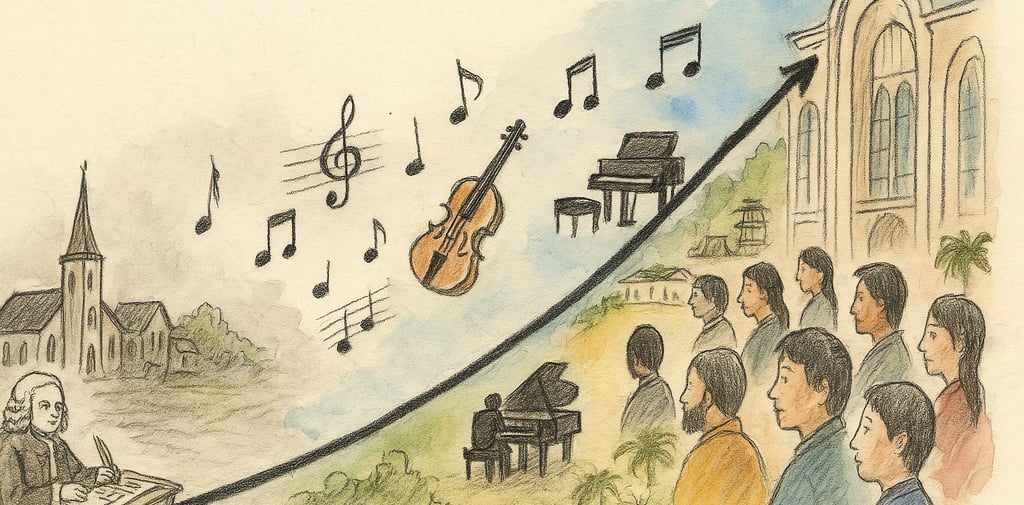Relevant Today or Prestigious for Centuries—Which Are You Building? J.S. Bach’s Long Game to Immortality
Discover what J.S. Bach’s legacy can teach modern leaders about reputation, prestige, and building work that lasts. A strategic reflection on long-term influence for businesses and organizations.
GROWTH STRATEGY
Brandon Lee Alsup
4/15/20254 min read


340 YEARS SINCE J.S. Bach was born—and his personal brand has never been stronger (almost 8 million monthly listeners on Spotify!)
Every leader I know would love to build something that lasts 340 years—I want to too!
Not just a good quarter or a viral campaign, but a brand, a company, a city, a body of work that carries weight. That earns trust. That means something—oh, that search for meaning.
In this essay, I want to pick one angle of reputation and explore what I can learn and share from the example of Bach.
For my purposes, reputation is an amalgamation of behaviors over time. It’s an earned memory in someone else’s head. Reputation isn’t something you can simply declare and expect to stick—there’s an element of time and relationship that comes with it.
I like pulling inspiration from the music world, and I’d say Johann Sebastian Bach has earned a reputation of the highest status—nay, his reputation has transformed into prestige. I investigate J.S. Bach’s rise and what insights may be worth keeping in mind as we execute our day-to-day behaviors in business and organizational life.
Reputation Without the Applause
Bach didn’t publish his first major composition until his late thirties (around 1726). Even though by then he had a local and regional reputation—he was one of the best keyboard players in Germany—he held his compositions to a very high standard.
Generally, as a composer, he wasn’t chasing fame. He didn’t worry about trends. He had deep conviction that he could bring people closer to God with his music, so needless to say, he took his craft very seriously. Yes, he made his living through music and composition, but he strove to create music that was worthy of God’s ears.
He had the focus to produce exceptional work. Consistently. Systematically.
Over time, he built a body of music that was dense, structured, spiritual, and profound.
And when he died in 1750?
His name faded. His music was considered old-fashioned.
His genius was known to a few, but he never got the standing ovation.
If the story ended here, I’d say Bach built a fantastic reputation. But the rest of the story propels him to legendary status.
What Happened Next?
Nearly 80 years later, a teenager named Felix Mendelssohn received a manuscript copy of Bach’s St. Matthew Passion (listen to it here).
Young Felix was stunned. Moved. Changed by it.
At just 20 years old, Mendelssohn conducted the first public performance of the piece in nearly a century. It was the spark that reignited interest in Bach’s work—and reshaped his place in cultural history.
Bach was long gone, so this wasn’t some sort of last-ditch marketing campaign. The secret was Mendelssohn’s advocacy.
Bach built the reputation with behaviors over a lifetime.
Mendelssohn spread the word—and people listened.
And this is where the story becomes a lesson for businesses and organizations:
Bach’s reputation didn’t grow by being clever.
It compounded from a handful of incredibly passionate referrals.
From Reputation to Prestige
Today, Bach’s name carries prestige.
Even this essay adds to the accumulation of high status and prestige that Bach enjoys.
Prestige isn’t just being well known.
It’s being so well-regarded that others want to associate with you—because your powerful reputation rubs off.
If you perform Bach, people assume a certain mastery.
If you study Bach, it signals depth and seriousness.
If you use his name in an essay, it elevates your point.
Prestige is what happens when your reputation becomes a force multiplier.
And here’s the real lesson:
Bach didn’t build that prestige directly.
He just made the work so good, so consistent, so enduring—that others wanted to carry it forward.
What This Means for Your Business
Okay, so we’re not all Bach. We’re not all in the music business.
But I argue that if you’re building an organization—especially one that you want to last—you can learn from Bach’s behaviors.
---
J.S. Bach Behaviors I Aim to Emulate:
Dedication to craft. When Bach was 20 years old, he walked 400 kilometers to meet and hear music by the most renowned organist of the time, Dietrich Buxtehude. He wanted to be the best, so he challenged himself to continually learn. Refine your craft, even when no one’s watching.
Quality. He was not interested in letting inferior work see the light of day. Let your work speak louder than your branding.
Passion. He devoutly believed he was composing for a higher purpose.
Consistency. He wrote over 1,000 pieces.
Networking. Though not a “networker” in the modern sense, Bach cultivated strategic relationships throughout his career—with royal patrons, town councils, employers, and other musicians. His ability to build credibility locally—while remaining creatively independent—allowed him to stay employed, funded, and creatively productive for decades. He didn’t just write great music—he made sure it had places to live.
The goal isn’t just to be known.
It’s to build something so good that people want to share it.
To work with you. To talk about you. To be associated with you.
That’s when your reputation becomes bigger than your reach.
That’s when your influence spreads—even in rooms you’ve never entered.
Final Thought
Every person—and likewise, every organization—is building a pattern.
Every action and decision is shaping how you're remembered.
You can chase trends.
You can play the fame game.
Or—you can build something so strong, so deep, so enduring—that others choose to carry it forward.
Reputation is behavior.
Prestige is what happens when others want to be part of it.
So create like Bach.
Because legacy doesn’t start with applause.
It starts with the work.
Relevant Today or Prestigious for Centuries—Which Are You Building?
J.S. Bach’s Long Game to Immortality
MAKE CONTACT
Locations
Las Cruces, NM 88007
Pattaya, Thailand, 20150
575-642-8363
brandon@ashrivers.com


